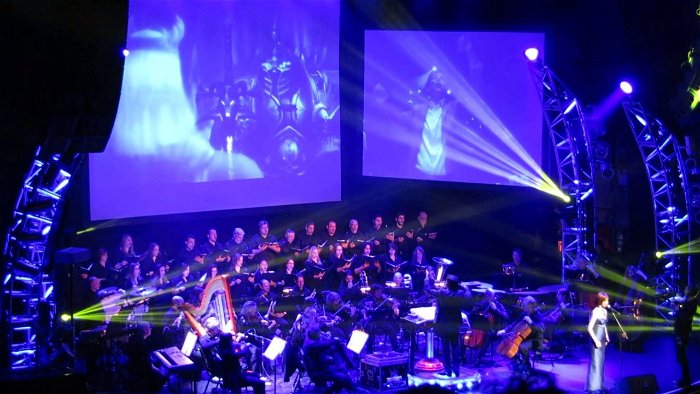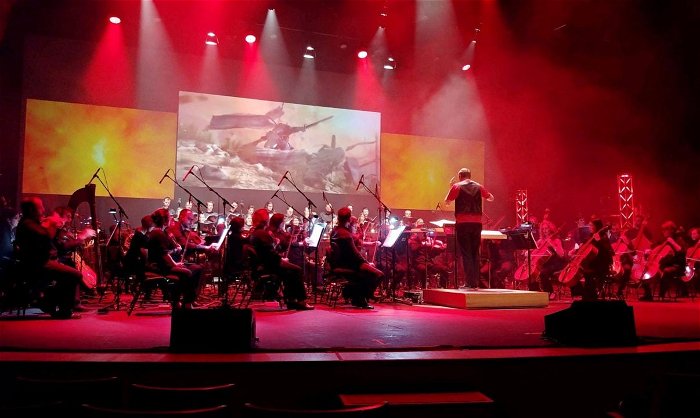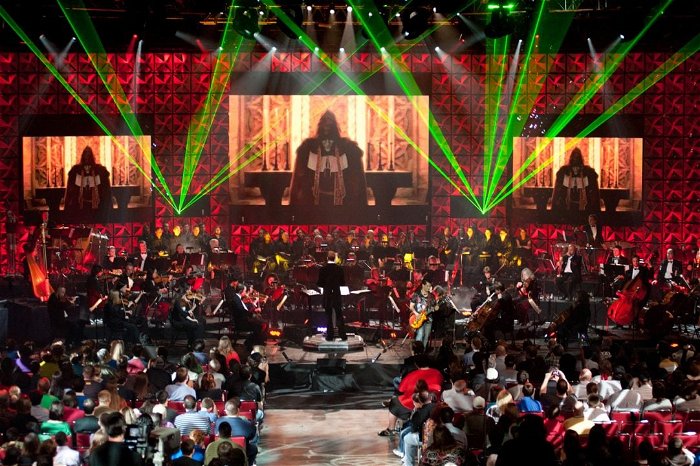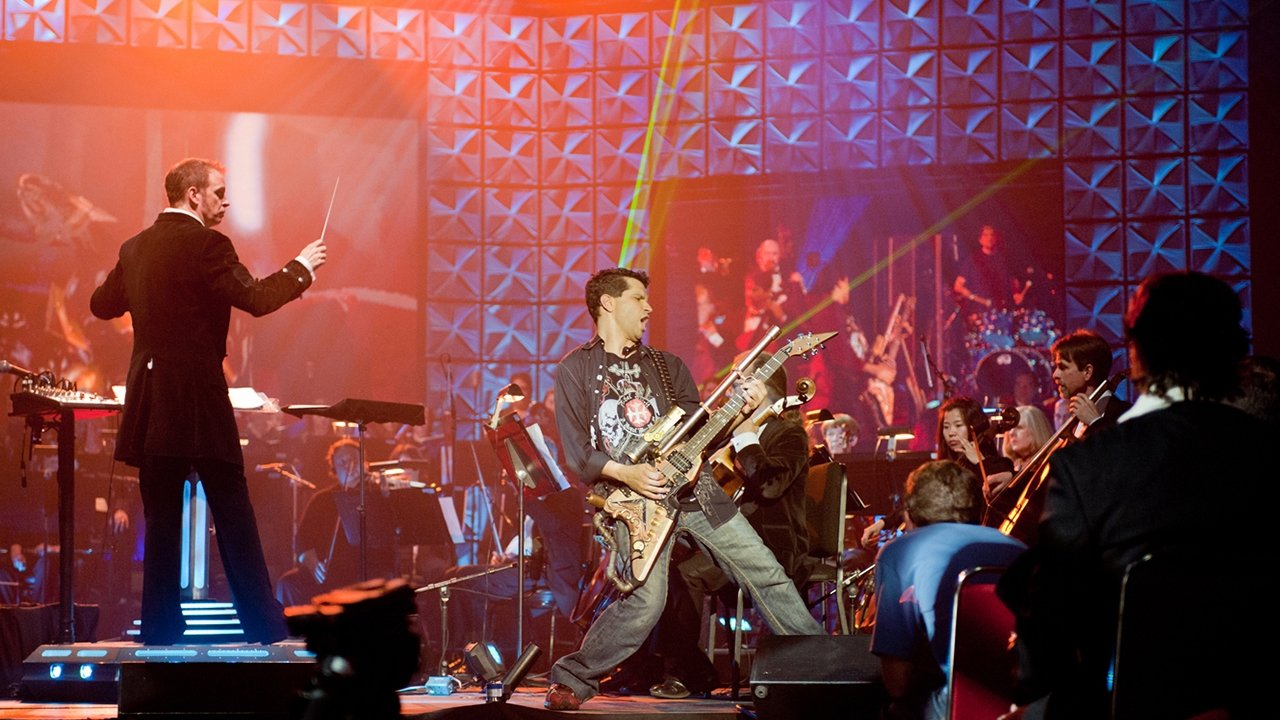With a full symphony orchestra and a synchronized video stream, Video Games Live is part rock concert and part gameplay marathon and Tommy Tallarico – the creator and front man of Video Games Live – is nearly as eclectic.
The composer and longtime host of Reviews on the Run now embraces his role as an ambassador and he hopes to introducing entire generations to the artistry and power of gaming. We spoke with the St. Catherines native during the Canadian leg of his latest tour, so keep reading to get Tallarico’s thoughts on the Grammy Awards, the evolution of game music, and the rapid growth of the industry Canada.
Comics & Gaming Monthly: Let’s start simple. What is Video Games Live, and what inspired you to bring this show to mass audiences?
Tommy Tallarico: I’ve been a video game composer for over twenty-one years, and I wanted to prove how culturally significant and artistic video games have become. I wanted to create a show for everybody, even for people who never played a video game at all. They come to the show, and they have a greater understanding and appreciation of what video games are about. I like to describe Video Games Live as all of the power and emotion of a symphony orchestra combined with the energy and excitement of a rock concert, mixed together with the cutting edge visuals, technology, interactivity, and fun that video games provide. All of that stuff combined, that’s what makes the show not just for hardcore gamers, but anyone who enjoys music or entertainment.

CGM: How would Video Games Live be different if it was a strictly orchestral performance?
TT: It’d be boring. Look, video game music can stand on its own. Absolutely it can. But my idea was to bring video games to life, and video games are much more than the music. Video games are about visuals, characters, storylines, and interactivity. They’ve been doing traditional symphony video game concerts in Japan for twenty-plus years with games like Dragon Quest. They’re very traditional, and it’s not a lot of glitzy this and that. And that’s cool. I think that’s fantastic that there’s stuff like that out there. But it’s not us. We don’t let our musicians dress in tuxedos. We encourage the audience to cheer and clap and yell. That’s our generation of people. We want to have fun. We want to express our emotions. And that’s a great thing when you’re onstage. The musicians, they’re like any other musicians. They feed off that energy. It’s big, it’s in your face, it’s exciting, it’s emotional, it’s powerful. That’s what games are. Why shouldn’t our show be like that?
CGM: Do you ever encounter resistance from people who try to view the game and the music as separate artistic entities? Did you have to break down those barriers?
TT: Well, sometimes when we work with the symphonies for the first time, there’s a bit of apprehension because some of the older symphonic players, they’re paging through the music going, “Sonic the Hedgehog? World of Warcraft? What is this? This isn’t Stravinsky.” And a lot of people who might not know what video game music is and where it’s progressed to, they might be thinking, “Ah, I’m just gonna pluck out a bunch of [bloop bloop bloop bloop bloop] all night long.” But when they hear the music – when they hear the stuff we play from Final Fantasy, or Warcraft, or God of War – you can see them looking around and nodding their heads going, “OK, this is legitimate music.”

Then the show happens, and thousands of young people are screaming and cheering like it’s the second coming of Elvis Presley, and that’s when it really hits them. They’re coming up to me after the break going, “I’ve been playing oboe for forty years, and I’ve never heard an audience this loud before. When are you guys coming back, this is fantastic, I feel like a rock star.” Again, I understand where they’re coming from, but by the end of the night, it’s the best show they’ve ever played and they look forward to it every year. So it’s pretty cool, watching the transition.
CGM: The Grammy Awards are now giving video games the same billing as film and television and you’ve been at the forefront of that movement. Could you describe your involvement with the Grammys, and what do the changes – as well as Christopher Tin’s recent victory for a song that originally appeared in Civilization IV – say about the increasing recognition of video game music?
TT: I’ve been a member of NARAS [the National Academy of Recording Arts and Sciences, the organization that hosts the Grammys], and back in 1999, myself and [composer] Chance Thomas wrote a proposal saying that video games should be included in the Grammy Awards. In 2000 we were put in with film, and television, and they added a thing that said “and other visual media.” So we’re like, “It’s better than nothing, at least we can compete.” But you’re only eligible for a Grammy if you come out with a CD or an album. You have to have a God of War soundtrack album that has to be sold in the United States.

And so in 1999 we were ahead of the times because there were maybe two or three video game soundtracks coming out a year. Now, we have about seventy-to-a-hundred video game soundtracks that come out every year. So myself, the head of EA, Steve Schnur – there’s a group of about ten of us – wrote up a big proposal to say, “Look, you’ve got to change this category, it’s just kind of disrespectful.” There’re more video game soundtracks coming out than television soundtracks. So they’ve decided to call it “film, television, video games,” and whatever.
But make no mistake – our goal is to have our own category in the Grammys because what we do is so different than a film or television composer. They write for linear media. It’s considered post-production, what they do. It’s a different way of writing music. So I think eventually we will get our own category. It’s going to happen within the next couple of years.
Now Christopher Tin’s song, for ‘Baba Yetu’ – Video Games Live were the first people to play that music live. We debuted that at the Hollywood Bowl in 2006, and we’ve been playing it ever since. So for us, that was a huge win. For Christopher to go up there, accept the Award, and say during the broadcast, “This is the first time video game music has ever won,” that sent a spike through the whole NARAS community. That’s huge for everybody.
[Note: VGL concludes its Canadian run in Kingston, Ontario on May 3]
To read the full article see this months Comics & Gaming Monthly



